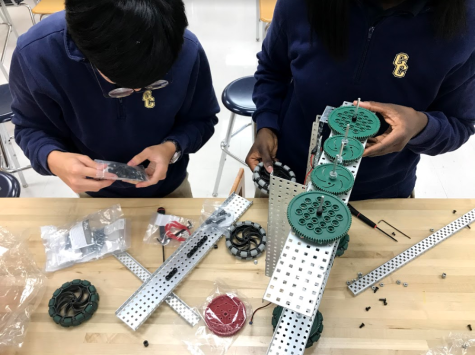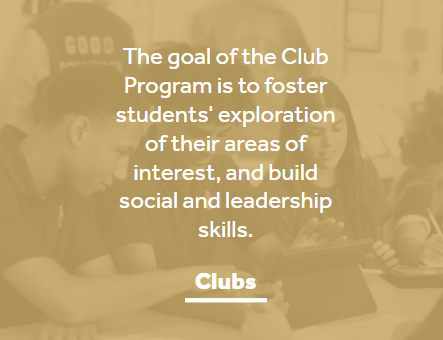

The purpose of a high school is to build a foundation for students to succeed in life. This is done through teaching them and testing them in the classroom. However, a vital aspect of this that we must not forget is extracurricular activities. Extracurricular activities are essential to improving students’ well-being and nurturing their passions. They gift students with team-building skills and the opportunity to make connections that will stand the test of time. Extracurricular activities also serve as a way for colleges to assess a student’s passion, initiativeness, and leadership skills. However, despite their multiple benefits, there has been a recent decline in club engagement at Our Lady of Good Counsel High School.
In 2019-2020, the world witnessed the horrors of the Covid-19 pandemic. During this period, many systems faced an unprecedented situation that led to long-lasting damage. One of these systems was the Good Counsel club system. Without being in-person, clubs could not advertise to students, and those who did seek out clubs were met with a chair missing a leg. Despite the best efforts of club administrators and leaders, organizing meetings and events in this unfamiliar world was nearly impossible. So, while students may have been interested in the Gaming Club during Covid-19, that interest slowly dissipated as it met with a lack of engagement from the club itself.
However, even after the Covid-19 pandemic, clubs are witnessing lower members and engagement. While part of the problem lingers from the Pandemic there’s more to it. As a student, one’s responsibilities can be divided into three plates: academic, social, and personal. A student must balance these three plates, but in addition, clubs serve as a fourth extracurricular plate to the already tipping mess that is the balance of a high schooler. And, during the pandemic, masses across the globe were slapped with the reality of mental health issues. As the medical director at Magellan Healthcare said, “COVID-19 has shown people that mental health is real, mental health can be severe, mental health can be difficult to treat, and mental health resources may be difficult to access.” Due to this newfound awareness, many are deterred from putting more of a strain on their mental health by adding that fourth plate.
Getting to school and leaving on time is crucial to a student. However, This ability is only partially dependent on most students because they rely on a second party for transportation. Many students are restricted to the bus. When the bus leaves, they need to leave. While beneficial, this dependency can easily deter students from joining clubs because of these transportation issues. Even though one could rely on a relative to serve as their transportation, club meetings sometimes conflict with the relative’s schedule, leading to its own series of inconveniences. At Our Lady of Good Counsel High School, many students who would join a club find that it is incompatible with their method of transportation.
Another factor for the deteriorating engagement of clubs is poor marketing. There are approximately 60 clubs at Good Counsel, yet the average student doesn’t know that. While this goes back to the lack of opportunity to market one’s club during Covid-19, the situation persists. The opportunity for clubs to market themselves is mostly limited to Mrs.Hanson’s Daily Bulletin and sticking flyers to the wall, both of which fail to grab most people’s attention. So far, word of mouth is the biggest sales strategy for clubs, although it does not reach a large percentage of students.
Another reason for the lack of club engagement is, ironically, one of the benefits of club membership to students, its appeal to colleges. Which club/s a student joins, can sometimes tell more about a student than scores from the classroom, such as what their passions are and how they act on them.
However, misunderstanding of the college admission process, can deter students from pursuing clubs that pique their interest. It’s a common belief in the American household that top colleges favor students who are in the more “esteemed” clubs, which leads to students pursuing clubs that they are not as interested in. This happens when students want to appear to be well-rounded. However, it’s more common for colleges to look for a wide variety of experiences when trying to build a well-rounded class of freshmen. So, engaging your passions and building your individuality, may well increase your chances of admission to a particular college. As Jessica Yeager, founder of Impress the Ivies, writes, “Focusing on a handful of related activities and going really deep not only helps your child’s chances of admission but helps them figure out what they love to do. Isn’t knowing that the entire reason to go to college in the first place?”
The purpose of a club is for one to find an outlet for their passion. Clubs offer students the skills necessary to work in a team and allow them to make great connections. However, clubs see less engagement because of student stress, the often incompatible nature of transportation, poor marketing, and a misunderstanding of the college application process. This lack of engagement is unfortunate due to how crucial clubs are to expanding one’s perspectives. Is there any way to counter this downward trend? Fortunately, yes. Good Counsel can utilize their social media presence to spread information about its various clubs. As a result, the club system could receive a much needed lifeline. In addition, deploying a second round of buses at 4:30 could amend pressing issues for many of the student body. While these solutions don’t address all the problems facing the club system at Good Counsel, they could serve to allow at least one more student to benefit from joining a club.
Resources:
Building a Well-Rounded Class: Why Colleges Want Specialists | IvyWise
The Pandemic Raised Mental Health Awareness. Will It Last? (verywellhealth.com)
Clubs heavily declining in membership, engagement (thematadorsghs.us)

